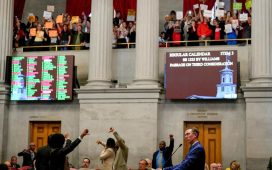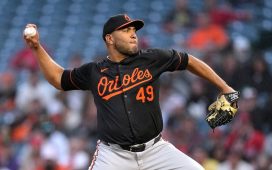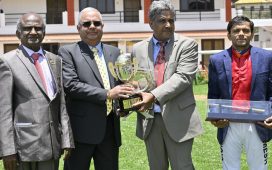Jockey Hector Rafael Diaz Jr.
When Hector Rafael Diaz, Jr., dreams about racing against his brother, he can’t identify the track or what horse he’s riding. He doesn’t know if it is a stakes or a $5,000 claiming race.
All that remains is the pure joy of competition.
As the siblings turn for home, their horses vying head-to-head, neither jockey gives an inch. Each seems to know what the other is thinking, and Hector Rafael’s adrenaline skyrockets from the thrill of knowing that he and young Hector Miguel are living the life they were meant for.
When he wakes up, Hector Rafael is unsure who won. He snaps into a harsh reality, the scenario so vivid in his mind only a fantasy.
But there is no time to dwell on sadness or regrets. Hector Miguel, 27 (“Migue,” to family and friends), is back home in Trujillo Alto, Puerto Rico, in a wheelchair, paralyzed from the waist down by a riding accident at Hipodromo Camarero in Canovanas on Jan. 3, 2015, almost two years before Hector Rafael rode his first race.
Chances are, Migue already has studied the past performances for his brother’s mounts at Tampa Bay Downs and is ready to offer his observations and advice by phone.
Leaving home before daylight to work horses and get ready for the races, Hector Rafael kisses his fiancée Deyanyra and her 3-year-old son, Andrew. Being at Tampa Bay Downs, where he is tied for third place in the standings with 38 victories, feels like a dream come true.
A dream he shares with his brother.
“I would have loved to ride with him, to compete against him,” said the 31-year-old Diaz, whose 18.5-percent strike rate at the meeting is fourth-best at Tampa Bay Downs among jockeys with 100 or more starts. “In my dream, I think my brother beats me sometimes and I beat him sometimes. But it doesn’t really matter. It’s just us doing what we love, what we dreamed of doing.”
Their father, Hector Rafael Diaz, Sr., was also a jockey, retiring in his mid-30s after incurring more than his share of injuries. Neither he nor their mother, Norma Sanchez, wanted the boys to become jockeys, but years of going to Camarero to watch their father compete had already stoked their passion. Having an even more well-known pair of brothers as cousins and neighbors – Irad Ortiz, Jr., and Jose Ortiz – provided more fuel for the Diaz boys’ fire.
“Every parent wants their kid to be a doctor or a lawyer and have a good career. I was a good student, and they wanted me to keep studying,” Diaz said. “But my brother and I went to the races every weekend to watch our father race, and we both came to want it.
“My brother didn’t do it for money. He loved riding horses, and I’m the same way. This is not a job for me.”
The brothers talk on a daily basis, the discussion usually coming around to the horses Hector Rafael rode, or is scheduled to ride. “Migue is on top of all my horses,” said Diaz. “I call him when I finish working to talk about the races and I call him after the last race. He’ll tell me what he thinks about the horses I’m riding, and we’ll go over how to ride a race if ‘Plan A’ goes out the window when the gate opens.”
Migue, who is married with a 7-year-old son, Jesier, who wants to be a jockey, watches races from numerous tracks through his TVG account, but he is laser-focused on Tampa Bay Downs as his older brother climbs the ladder of success.
“His brother follows everything he does,” said Shawn Klotz, Diaz’s agent. “From what Hector tells me, his brother could flat-out ride. He was one of the best jockeys out there.”
The record bears that out. During his three-year career, which began in 2012 when he was 19, Migue won 477 races from 2,558 mounts – an 18.6-percent strike rate – and captured three graded stakes in Puerto Rico, including two Grade Is.
“I thought he was the best rider I’d ever seen. We don’t know how good he could have been,” said Hector Rafael.
Around the same time Migue’s career was taking off, Hector Rafael, then 23, enrolled in the Escuela La Vocacional Hipica jockey school. He stayed there a year, then headed to New York to work as an exercise rider for trainer George Weaver.
In the fall of 2014, Migue moved north to reunite with his brother and ride at Belmont Park, Laurel, Aqueduct and Meadowlands. He managed four winners from 42 mounts, but the combination of the unfamiliar surroundings, a language barrier and frigid weather led him to return to Puerto Rico before the year ended.
That December, Hector Rafael took a vacation from his job for Weaver, returning home for the holidays. He was at the beach when Migue called him from the racetrack, reminding him he had one more race to ride and asking him to wait for his arrival.
About 20 minutes later, Irad Ortiz, Jr., called Hector Rafael and told him his brother had been in an accident. The horse inside Migue’s mount came out a little, his horse clipped heels and the rider tumbled off, landing on his head and paralyzing his lower body.
Life can never be the same for an athlete who becomes paralyzed, especially one nearing the prime of their career. A little more than six years later, Migue sounds matter-of-fact about his accident, almost as if it had been an out-of-body experience he viewed through a camera lens. What beats inside him is perhaps best left between himself, family members and God, but he never blamed the sport or anyone else for what happened.
“I knew the risk when I chose to become a jockey,” Migue said in a recent Facetime conversation, which Hector Rafael translated for a reporter. “You know something like that can happen, but you don’t think about it.
“God had other plans for me, and I’m following that. I am my brother’s No. 1 fan, and I take his victories like they are mine.”

The Diaz brothers with their mother, Norma Sanchez
After the accident, their parents implored Hector Rafael to give up his dream and pursue another career. But he had already made up his mind.
“I had always wanted to be a jockey, but my brother getting hurt made me want it even more,” he said. “I thought, he can’t do it anymore, so now it’s my turn. I told my parents ‘I respect your feelings, but this is what I love, and this is what I’m going to do.’ I have to stay strong for him. He’s not showing weakness, so I can’t show weakness.”
While his brother began the arduous task of rehabilitation and learning to cope with a new way of life, Diaz returned to New York for more seasoning. His moment of reckoning came in a claiming race at Aqueduct on Nov. 11, 2016, when he rode Weaver’s 3-year-old filly Shoppingforsilver, owned by West Point Thoroughbreds, to a second-place finish in his first career race.
“It was me, Javier Castellano, Irad and Jose, and Manuel Franco (and Addiel Ayala) in that race. All good jockeys,” Diaz recalls, smiling at the memory. “I was a little nervous, but I enjoyed it. Being in the jockeys’ room in New York was a great education. I learned a lot from guys like Cornelio Velasquez and Kendrick Carmouche, and Irad and Jose. You could go to any corner of that room and learn things from jockeys who were glad to share their knowledge.”
His first career victory on Jan. 15, 2017, aboard Honorable Jonas launched a year in which Diaz rode 74 winners, earning recognition as a finalist for an Eclipse Award as Outstanding Apprentice Jockey. Another graduate of Puerto Rico’s jockey school, Evin Roman, won the award, but by staying in New York, Diaz established his ability to compete against many of the finest jockeys in the country.
“I started working with Hector that summer at Monmouth Park, and we won a bunch of races,” said Klotz, his agent. “Winning is what gets a jockey into new barns, and there were a lot of good outfits that wanted to use him.
“Hector studies races, he listens and he is always willing to learn. He is very patient – he isn’t going to make a premature move that gets a horse beat. He’ll sit and wait for his chance to pounce, but if there is no speed in a race, he’s comfortable being on the lead,” Klotz said.
Last year, Diaz finished fifth in the standings at Monmouth with 30 victories. That performance came after he fractured three vertebrae in a fall at Aqueduct, causing him to miss six weeks, followed by almost three months off due to track closures caused by COVID-19.
Toward the end of Monmouth’s season, trainer Michael Stidham’s assistant, Ben Trask, suggested Diaz forgo New York’s lucrative purses and give Tampa Bay Downs a shot. After weighing the pros and cons, Diaz decided it could only benefit his career exposing his talent to a brand-new audience.
“When I left New York last fall (soon after riding trainer Arnaud Delacour’s 2-year-old colt Arrest Me Red to victory in the Atlantic Beach Stakes at Aqueduct on Nov. 6), I felt like the best rider out there,” Diaz said. “No disrespect to anybody; there are a lot of great riders who if they’ve got the horse, are going to show their talent. But when I’m riding races, I feel like I can do anything they can and nobody can outsmart me. That’s the confidence I built being in New York with all those good riders.”
Diaz has won eight times for the Stidham barn this season, while also winning races for 16 other outfits. But Trask said the decision to use Diaz as the stable’s “go-to” jockey in Oldsmar was based on more than his ability to win races.

Diaz winning aboard Skol Chant for trainer Michael Stidham
“It’s very hard for someone who has never been here before to come in and be successful, because you have a handful of guys, like (Samy) Camacho and (Antonio) Gallardo and (Daniel) Centeno, who win a lot of races,” Trask said. “But Hector was already part of our team, and he knows what it takes to get the job done.
“Anybody can win a race. But Hector is a team player who got to see what happens behind the scenes when he worked for George Weaver, and that makes a big difference,” Trask said. “I have 40 people working in our barn, and he knows all their names and speaks to everybody when he comes to work. Hector never has a chip on his shoulder. When one of our guys shows up in the paddock with a horse, he greets them with respect.”
Kathleen O’Connell, who also uses Diaz on many of her horses, has helped cultivate the careers of numerous good jockeys, including Gallardo. She believes Diaz has the skill, confidence and courage to be as good as any of them.
“He is already polished, and I think he has a great future if he keeps doing what he’s doing,” O’Connell said. “He is smart enough to know that you learn every day. You always need luck and the right horses and everything else, but as long as he keeps an open mind, he will keep progressing.”
O’Connell said Diaz’s style puts horses at ease. “There is a big difference between taking a light hold and strangling a horse, and he has very kind hands on a horse and is astute as to how they are traveling. He cares about the animals and is a good communicator.”
After competing in New York as a proverbial small fish in a big pond, Diaz is getting noticed on a widespread basis. He is comfortable with his status as one of the top four jockeys this season at Tampa Bay Downs and the extra attention that comes with it.
“To be up there with guys like Gallardo and Centeno, who have won multiple titles, and Camacho, that is amazing,” Klotz said. “Those guys are cornerstones of Tampa Bay.”
Diaz – who has an 11-year-old daughter, Heclian, and a 2-year-old son, Jayden, from previous relationships – yearns to see his brother and his parents soon; he hasn’t been home in a few years. He says his parents are more accepting of his career choice and proud at how he represents himself and the family.
“My father calls me a lot to talk about the horses and my career. I know it’s tough for parents to see their kid can’t walk, and I know there are nights when they cry in bed,” Diaz said. “But Migue is alive, and that’s how we have to view it.”
In surroundings that are often hectic, when every move he makes can mean the difference between winning and losing, Diaz puts everything else out of his mind. But win or lose, he is uplifted knowing Migue provides another set of eyes that are invaluable in helping to keep the family tradition strong.
“My brother is my hero. I don’t think I would ever have taken what happened the way he does,” Diaz said. “He is the one who gave me the big push to do what I am doing now. I don’t know why, but I never think about his accident. I pray God to protect all of us riders on the track, but we got to compete. When I’m on top of a horse, I just think about winning the race.”
Diaz has another dream, one he carries in his heart. “I always say if I do real good, I want to take him somewhere to doctors who can help him walk again. That is my goal. He is grateful he is alive, and I am grateful he is alive. We know things could be a lot worse. But there is always a hope, and we never lose that.”
It is a dream worth sharing, with the racetrack community and the world.
New to the Paulick Report? Click here to sign up for our daily email newsletter to keep up on this and other stories happening in the Thoroughbred industry.
Copyright © 2021 Paulick Report.







